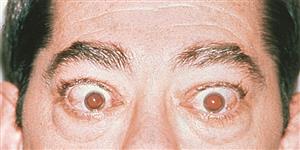Thyroid Eye Disease
Thyroid Eye disease, is a problem that usually develops in people with an overactive thyroid caused by Graves’ disease.
WHAT IS THYROID EYE DISEASE
Graves’ eye disease, also called Graves’ Ophthalmopathy or Thyroid Eye disease, is a problem that usually develops in people with an overactive thyroid caused by Graves’ disease. Graves’ disease is an autoimmune disease caused by antibodies directed against receptors present in the thyroid cells and also on the surface of the cells behind the eyes. Rarely can also affect the skin, usually the front part of the legs. This usually results in a generalized over activity of the thyroid gland (hyperthyroidism). Up to one-half of people with Graves’ disease develop eye symptoms. These are usually mild and treatable.

HOW IS THYROID EYE DISEASE TREATED?
If you have Graves’ Ophthalmopathy, one or more of the following treatments may help soothe your eyes and improve your vision:
Apply cool compresses to your eyes. The extra moisture may provide relief.
Wear sunglasses. When you have Graves’ eye disease your eyes are more vulnerable to ultraviolet rays and more sensitive to sunlight. Wearing sunglasses helps protect them from both sun and wind.
Use lubricating eyedrops. Eyedrops, like artificial tears, may help relieve dryness and scratchiness. Be sure to use eyedrops that do not contain redness removers. A lubricating gel can be used before bed to prevent the cornea from drying out because your eyelids may not cover the entire eye when sleeping.
Elevate the head of your bed. Keeping your head higher than the rest of your body may reduce swelling and may help relieve pressure on your eyes.
Prisms: If double vision is a problem, glasses containing prisms may be prescribed by your doctor. However, prisms don’t work for all people with double vision and your doctor may recommend surgery as a more effective option
Steroids. Swelling in the eyes may be improved by treatment with steroids (such as hydrocortisone or prednisone)
Eyelid surgery. Because in Graves eye disease, the eyelids are usually more widely open, some patients may have difficulty closing their eyelids, leaving the eyeballs more exposed, which causes excessive tearing and irritation. Surgical repositioning of the eyelid may help reduce the irritation.
Eye Muscle Surgery. Sometimes scar tissue from Graves’ Ophthalmopathy can cause one or more eye muscles to be too short. This pulls your eyes out of alignments, leading to double vision. Eye muscle surgery may help correct double vision by cutting the affected muscle from the eyeball and reattaching it farther back. The goal is to achieve single vision when you read and look straight ahead. In some cases, you may need more than one operation to get these results. These procedures are performed by an eye specialist called an ophthalmologist.
Orbital Decompression Surgery. When eyesight is threatened, a type of surgery called orbital decompression can be done. In this procedure, a bone between the eye socket (orbit) and sinuses is removed to allow more space for the swollen tissues. When the procedure is successful, it improves vision and provides room for your eyes to return to their normal position. There is a risk of complications, including double vision that persists or appears after surgery.

All these surgical interventions should be performed at a medical center with expertise in this area as they require a team approach, and correct timing to ensure best likelihood of success and minimize risks. Working with an Eye Doctor in Port Orange area who is experienced in the treatment of various eye diseases is vital.
It is important that thyroid blood levels be maintained in the normal range. After treatment of an overactive thyroid, there is a high risk of becoming hypothyroid (an underactive gland). Adequate thyroid replacement is essential to help keep Graves’ eye disease from getting worse.
